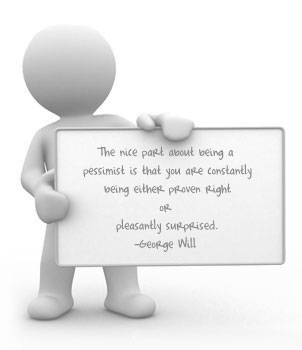If you read this blog you have probably seen me cite Steve McConnell mention that optimism is one of the biggest reasons for projects failing in the software development world. You probably have also seen me mention that I am basically a pessimist.

Jokes apart, I do not truly consider myself a hardcore pessimist. What I like doing however, is listening to the critic inside of me. Michael Lopp explains this thought approach rather articulately in his legendary book, Managing Humans. He explains:
This is your internal voice, which does careful and critical analysis of your life, and he’s gained a powerful place in your head because he’s saved your butt more than once.
He’s the one who told you that offer from the startup smelled too good to be true. You remember that company, right? The one that simply vanished three months after you declined that stunning offer letter. It was the Critic who said, “How in the world can they afford to give anyone this type of offer when I don’t even understand their business model?”
The Critic was the one who calmed you inner nerd and convinced you to not buy HDTV three years ago, and he told you not to trust that fast-talking engineering manager who emphatically guaranteed his team would be done on schedule.
The Critic said, “People who talk fast are moving quickly to cover up the gaps in their knowledge.”
The Critic was right.
If you have ever worked with a team when the sky is falling you probably know that the first part of the deal with getting out of the shitty situation is that you do not panic.
The second part is weaving an inspirational story which you yourself believe in and then telling it to your team. Its the absolutely amazing inspirational pep-talk that you see in Hollywood movies after which the team goes out and wins the game.
Its the third part that is actually more tricky. While your entire team is pepped up and working the third part involves listening to the critic within you when he starts calculating the possibility of your team not being able to make it in time.
It is your critic who nudges you to start thinking of alternate ways of getting out of shit.
It is your critic who tells you to start talking to the customers in advance and let them know that the cute user interface you promised them is not going to be a part of the next sprint.
It is your critic who tells you to start talking to the right people in the culture chart and tell them that you might be missing out on features in the next release.
It pays to listen to your critic, because when Jack comes to you a day before the release and tells you that the last three items in the backlog might not ship, you don't give him that intimidating look. Instead, you smile back and tell him it is not a problem at all.
Your critic can be really helpful at times.
When it starts mumbling in its usual soft voice, it is time to shut up and listen.
I wish you good luck.
Comments are closed.